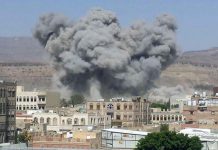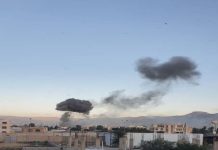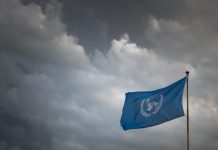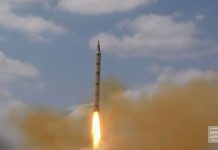The leader of the Yemeni revolution Sayyed Abdul-Malik al-Houthi, on Thursday accused several Arab and Islamic governments of colluding with “Israel” through normalization and economic ties, despite the ongoing Israeli military aggression and humanitarian crisis in the Gaza Strip.
In his weekly speech on Thursday, Sayyed Abdul-Malik denounced what he described as the “systematic starvation” of over two million Palestinians, blaming Arab regimes that claim to represent the Islamic world for failing to act.
He said many of these governments are complicit, either through silence or overt cooperation.
“Normalization is no longer a mere diplomatic relationship,” he said. “It has become open collaboration with the enemy of the nation. Some Islamic regimes that publicly express sympathy for the Palestinians are, in reality, among the top trading partners of the Israeli occupation.”
Sayyed Al-Houthi claimed that these governments play a “functional role” in discouraging public support for the Palestinian cause, accusing Arab media of echoing Israeli and American narratives that portray pro-Palestinian resistance groups with suspicion.
He criticized efforts to pressure Palestinian factions to disarm, saying demands to strip Hamas and Hezbollah of their weapons only serve Israeli interests. “Our nation is in dire need of weapons to defend its dignity,” he said. “Calling for disarmament in the face of aggression is the height of foolishness.”
Sayyed Al-Houthi argued that the Israeli occupation is rooted in an ideology that dehumanizes Arabs and Muslims. “What the Zionists are doing is not just political — it’s ideological, viewing Arabs as subhuman,” he said.
He also gave details of Yemen’s military operations in solidarity with Gaza.
According to Sayyed Abdul-Malik, Yemeni armed forces have carried out 11 attacks in the past week using drones and hypersonic missiles against Israeli targets.
He confirmed that a total of 1,679 operations have been launched, including naval strikes that have disrupted shipping through the port of Eilat (also known as Umm al-Rashrash), causing what he described as “significant economic losses.”
Despite a joint US-British-Israeli bombing campaign that has reportedly hit Yemen with nearly 2,900 airstrikes, al-Houthi said the movement’s support for Gaza remains unchanged.
“Our principled position in support of the Palestinian people will not waver,” he said.
Sayyed Abdu-Malik al-Houthi called on the Arab regimes neighboring Palestine, specifically Egypt, Jordan, and Saudi Arabia, to open crossings allowing Yemeni fighters to reach Palestine to support the people of Gaza and the Palestinian resistance.
“We once again call on the regimes of the countries that geographically separate our country from Palestine to open passageways for our people, who will mobilize hundreds of thousands to support the Palestinian people,” he said during his speech.
He added, “Opening crossings to support the Palestinian people is what we hope for and strive for. We hope to achieve this and are striving to achieve it.”
He emphasized that the Yemeni people are suffering greatly, and the voices of the people in demonstrations and marches attest to the level of this interaction and the presence of the will.
The leader of the revolution also praised popular mobilizations across Yemen, including tribal protests and university demonstrations, and extended special recognition to the Grand Muftis of Oman and Libya for what he called their “honorable” support for Palestine.
In contrast, he criticized Egypt’s Al-Azhar University, describing its stance as “shameful.”
He called on the Yemeni people to participate in an unprecedented million-man march tomorrow in support of the Palestinian people in the Gaza Strip.



















